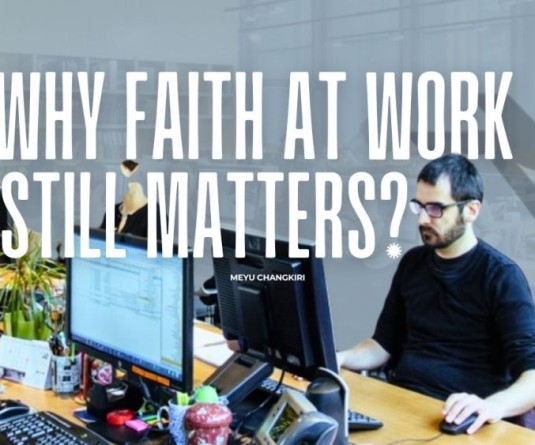
Kedo Peseyie
A few years ago I was part of the editorial team of a small Christian newsletter. Few weeks after we released the third issue we received an e-mail from one of our readers who preferred to remain anonymous. We did receive emails, and a lot of encouragements and suggestions. But this was one of the most interesting and engaging email we ever received. And disturbing too, because the person who wrote it was apparently feeling very redundant about church services and this thing called ‘Christianity’. As I read the mail a second time, I discovered that the core of his (or her?) struggle was for meaning in life. The writer had lost it, or somehow never found it. At the end of the mail was this poem:
I want to break free,
The world is too
Complicated for me.
What have I done to myself?
What have you done to me?
My mother surely did not labour
so painfully for me
simply to expect this little return
(oh I pity her).
What of this life then,
is so special, is so gifted?
Lingering with basically
no life in me – neither
talent nor spirit,
I only wait,
torturing myself to feel my mind
sink into the darkest
pits of insanity.
So tell me, my friend,
Am I worth living?
Or am I right to think of such things?
After reading the mail, I felt sad, but at the same time, I was glad to have found an honest person. Today people seem keener on showing that everything is ‘okay’ with them. I have attended meetings where people have shared, ‘Oh, if I were to write the faithfulness of God in my life, I could go on writing.’ Impressed and challenged, I came back home and tried but could not go beyond two sentences. Maybe this only exposes my spiritual bankruptcy. But all of us can easily identify with our friend here when such expressions and cry for meaning in life is uttered. Many times—satiated with Christian clichés, which we hear and read repeatedly—we limit God to vain repetition of choruses and Christian activities and walk around with hurts, fears and insecurities inside.
These thoughts brought me to the question, ‘what is it about church services and Christianity that sometimes makes people feel redundant and nauseated?’ There may be many reasons, or there may not be any reasons at all. But one difficulty I see is that a Christian service sometimes does not provide us ample opportunity to express our human feelings of anger, rage, depression, frustration, fears and even unbelief. Yes, the Bible considers unbelief a sin, but all of us—in our sinful human nature—at some point or the other have found it difficult to believe. I am sure it is not a sin to give the church a human face. I am convinced that spirituality is not just about praising God and feeling good in His presence. It is not only about having your quiet time in the morning. It cannot be confined to Bible reading, prayer, fellowship and evangelism no matter how important they are. True Christianity is one that encompasses the totality of life from eating breakfast to nation building. It is not always about joy and happiness. It is not always about satisfaction in prayer because sometimes there is something very unsatisfying and unfinished about prayer if good works does not follow it. I am afraid there are some in the church today who think the prayer is for our personal satisfaction and peace of mind. Such people often understand spiritually only as an internal thing. But true spirituality stops pretending that everything is fine with oneself and with the world and seeks to correct the fault instead of ignoring it. Wounds in our body may get serious afterward if they are ignored and not treated in time. True spirituality is also about our cry of agony and pain; it is about our cry for justice, truth and fairness in the world. And sometimes it takes more courage to cry.
The book of Psalms was the prayer book and songbook of the people of Israel and the New Testament Church. They are still favourites for many of us, but at times we forget that psalms include even protests and complaints against God. There are expressions of confusion, rage, depression, loneliness etc. in the Psalms (Ps. 10, 13, 22 etc.). But the basic difference between our complaints today and the psalmist’s complaint is this:— behind all the outbursts of rage and frustration in the psalms is the theme of trust and courageous faith in God who can (and will) intervene in any human affair be it small or big.
Dear friends, let us be bold and courageous to approach God with all that we feel about life. God is interested in all the emotions we harbour in our hearts and is able to heal and correct them. Vinoth Ramachandra says, ‘ . . . it is those who suppress their doubts under a litany of jolly choruses who may well be guilty of unbelief: for they refuse to believe that God can handle their rage.’
Finally, to my dear readers who identify with the anonymous poet I quoted above, hold on! God created your emotions. He understands the conflicts. Nothing is too complicated for him. He is able to handle your anger, depressions, fears or any problem, if you only let Him…





